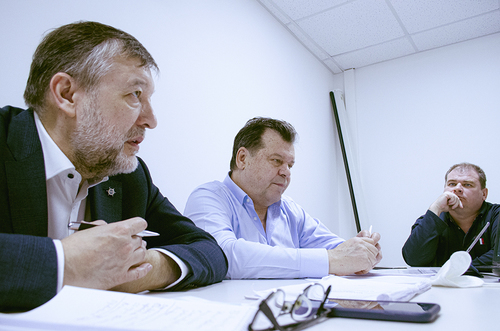ÐÎÑÑÈÉÑÊÈÉ ÏÐÎÔÅÑÑÈÎÍÀËÜÍÛÉ ÑÎÞÇ ÌÎÐßÊÎÂ
SEAFARERS' UNION OF RUSSIA
A NON-UNIONIZED SEAFARER
IS AN UNPROTECTED SEAFARER
Back
Seafarers from Astrakhan appealed to the shipowner through the Union

Representatives of the company Topaz and the Seafarers Union of Russia held talks in Astrakhan. The leitmotif of the meeting was the extension of the SUR collective agreement for the fleet of 17 multi-purpose vessels. The topic of further social interaction between the employer and the trade union related to that fact that Tengiz Chevroil project, in which the Topaz vessels are involved, is at the completion stage, so now the issue of preserving jobs is particularly acute. Representatives of the Topaz Astrakhan assured that the company is interested in retaining qualified personnel. «We have no plans to replace the staff. The seafarers have received special training, they know our fleet. Naturally, we will continue to make every effort to ensure that they have a job after the completion of the current project», - said Elina Duliyenko, financial manager of Topaz Astrakhan LLC. However, the future is still very vague. According to E. Duliyenko, attempts are currently being made to use MCV vessels for transportation in the Baltic and in the Black Sea. «There is a lot of competition among river-sea vessels in these regions, and political and economic sanctions complicate the situation»,- the company's representative continues.
Dialogue with seafarers
The issue of keeping the job was also discussed on the sidelines with Denis Bondarenko, chairman of the SUR trade union committee of Topaz Astrakhan. The seafarer noted that the lack of a clear perspective can push people to search for new jobs. «We get calls from the crewmembers of the company’s vessels, asking what's next, whether they will have work tomorrow. Of course, people are afraid of the unknown, because stability has always been one of the main advantages of working at Topaz»,- he said in an interview with the first Deputy Chairman of the SUR Igor Kovalchuk. Within the framework of the negotiations, a meeting of the trade union representatives with the current employees of the Topaz Astrakhan fleet was also organized. And again the same burning question was raised: what will happen next? Nikolay Fedorov, a Ch. Engineer from m/v Topaz Ural, has been working for the company almost since the launch of the Tengiz Chevroil project. «Both the salary and the convenient 2/1 work schedule here are attractive to me. So I want to understand what awaits the company's crew consist of about 300 people», - he says. By the way, Nikolay learned about the SUR long before the formation of a trade union organization in Astrakhan. In order to join the trade union, he even went to Rostov. As it turned out, not for nothing as the membership card soon came in handy. «In 2010, I worked as a Third Engineer for the company SevIn Trans, on board the m/v Senator–1. When the salary arrears exceeded 4 months, we appealed to the SUR and with their support announced a protest action I the port of Rostov. A lawyer from the seafarers ' union contacted the shipowner first, but was not responded. Then he appealed directly to the consignee in Turkmenistan, where the cargo was intended to transfer, and it gave a result. Under such a powerful pressure, the employer was forced to pay off the debt at least partially. We were paid about 80% of the total amount of the debt», - says Nikolay.
Fight for personnel
The negotiations also touched upon the issues of insurance of seafarers against accidents, the minimum safe manning, the quality of food on board the vessels and the level of remuneration for ratings. The Chairman of the Seafarers Union of Russia, Yuriy Sukhorukov, recalled that the salary remains the main motivating factor for the majority of seafarers and, in order not to lose their human resources, shipowners must provide the crews with decent pay. «The lower limit of the basic rate of the AB is set by the ILO’ s parity Maritime Commission. Now it is $641. Our union is actively involved in this work, and we closely monitor compliance with this condition on boards the ships where Russian seafarers work. Once again, this is the minimum standard. For example, the Baltic States set higher wage standards, and if you plan to work there, you need to be competitive, taking into account the standards adopted in a particular region»,- said the head of the Seafarers Union of Russia.
Up
